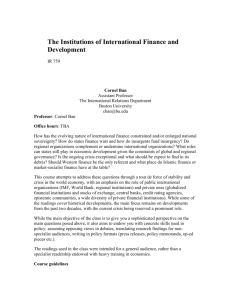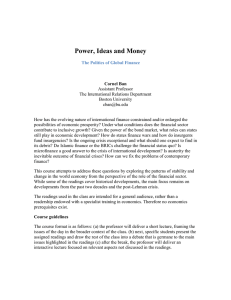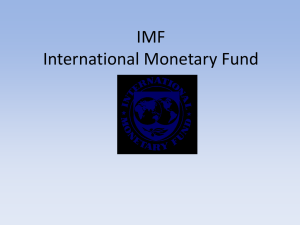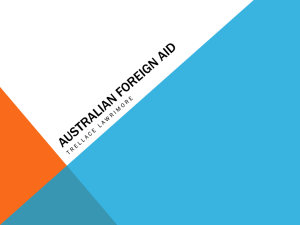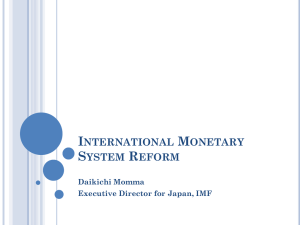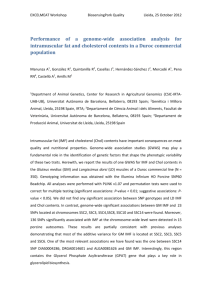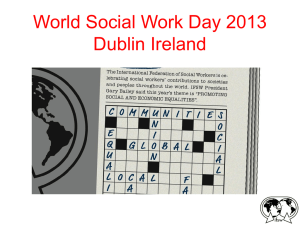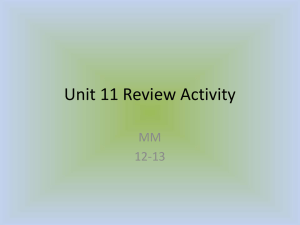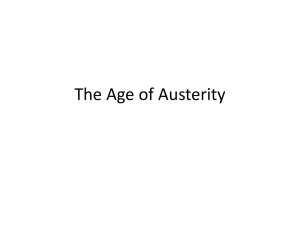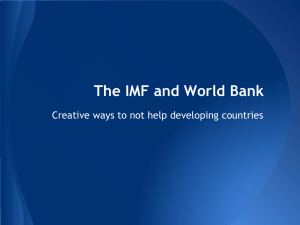IR759 syllabus_Jan 18
advertisement
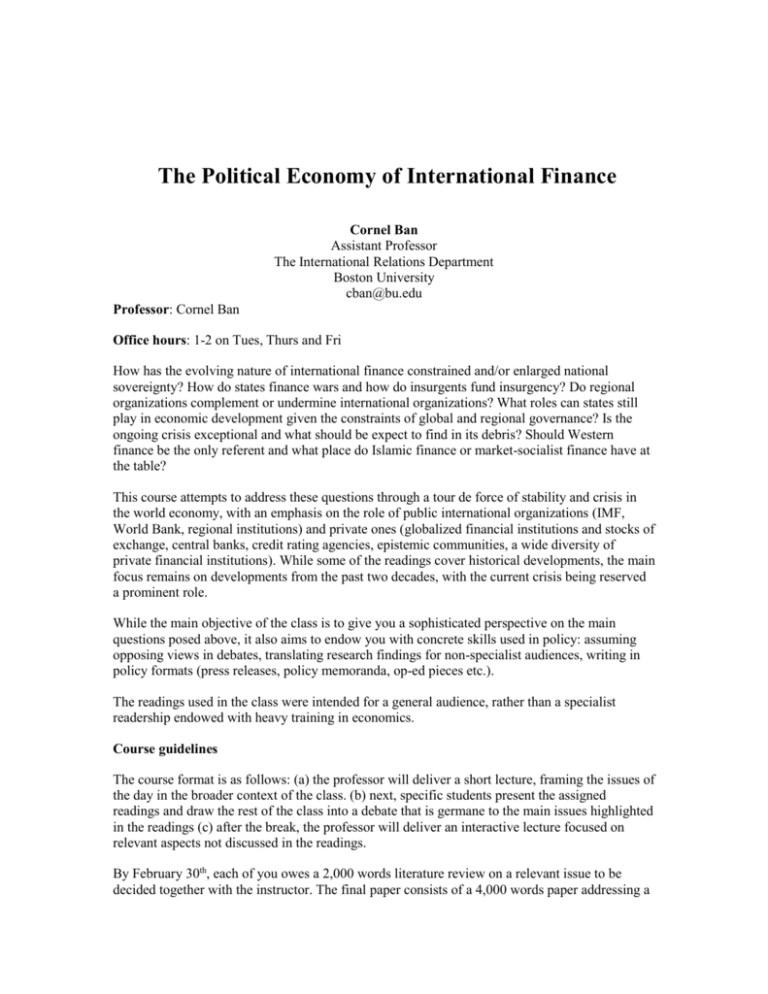
The Political Economy of International Finance Cornel Ban Assistant Professor The International Relations Department Boston University cban@bu.edu Professor: Cornel Ban Office hours: 1-2 on Tues, Thurs and Fri How has the evolving nature of international finance constrained and/or enlarged national sovereignty? How do states finance wars and how do insurgents fund insurgency? Do regional organizations complement or undermine international organizations? What roles can states still play in economic development given the constraints of global and regional governance? Is the ongoing crisis exceptional and what should be expect to find in its debris? Should Western finance be the only referent and what place do Islamic finance or market-socialist finance have at the table? This course attempts to address these questions through a tour de force of stability and crisis in the world economy, with an emphasis on the role of public international organizations (IMF, World Bank, regional institutions) and private ones (globalized financial institutions and stocks of exchange, central banks, credit rating agencies, epistemic communities, a wide diversity of private financial institutions). While some of the readings cover historical developments, the main focus remains on developments from the past two decades, with the current crisis being reserved a prominent role. While the main objective of the class is to give you a sophisticated perspective on the main questions posed above, it also aims to endow you with concrete skills used in policy: assuming opposing views in debates, translating research findings for non-specialist audiences, writing in policy formats (press releases, policy memoranda, op-ed pieces etc.). The readings used in the class were intended for a general audience, rather than a specialist readership endowed with heavy training in economics. Course guidelines The course format is as follows: (a) the professor will deliver a short lecture, framing the issues of the day in the broader context of the class. (b) next, specific students present the assigned readings and draw the rest of the class into a debate that is germane to the main issues highlighted in the readings (c) after the break, the professor will deliver an interactive lecture focused on relevant aspects not discussed in the readings. By February 30th, each of you owes a 2,000 words literature review on a relevant issue to be decided together with the instructor. The final paper consists of a 4,000 words paper addressing a policy question that is high on the current policy agenda. The format is not the academic paper but the policy memorandum. Special note: The format of the seminar emphasizes discussions and therefore there is no need to use laptops, ipads and iphones following the professor’s lecture. You can use handwritten notes at any time, however. Grading policy Each of the literature review essays will be worth 20 points of the final grade, while the final paper will be worth 40 points. The remaining 20 points will be covered in the following way: 10 points for class participation and 10 points for an editorial/letter to the editor prepared for Financial Times on one of the issues discussed in class to be delivered at any point before the end of the class, along with evidence of its submission (forward the letter to the professor). To keep up to speed with the latest research on hot topics in economics and political economy you are strongly encouraged to keep an eye on the following blogs: http://www.voxeu.org/ http://triplecrisis.com/ http://ineteconomics.org/blog http://blog-imfdirect.imf.org/ http://nakedkeynesianism.blogspot.com/ http://www.project-syndicate.org/ http://baselinescenario.com/ http://www.guardian.co.uk/global-development http://chrisblattman.com/ The daily reading of Financial Times is highly recommended Work and Ethics You are responsible to know Boston University’s Academic Conduct Code. Link: http://www.bu.edu/academics/resources/academic-conduct-code/ Books Eric Helleiner States and the Reemergence of Global Finance: From Bretton Woods to the 1990s, Cornell University Press, 1996 Barry Eichengreen, Globalizing Finance: A History of the International Monetary System, Princeton University Press, 2nd edition, 2008 Mark Blyth, Austerity: The History of a Dangerous Idea, Oxford University Press, 2013 William Janeway, Doing Capitalism: Capitalism in the Innovation Economy, Oxford University Press, 2012 Ronen Palan The Offshore World, Cornell University Press, 2005 2 Session 1. Introduction Session 2, Feb 24, Taking Stock Dani Rodrik, “Goodbye Washington Consensus, Hello Washington Confusion? A Review of the World Bank’s Economic Growth in the 1990s” Journal of Economic Literature, 2006. Helleiner, Eric. "Understanding the 2007-2008 global financial crisis: Lessons for scholars of international political economy." Annual Review of Political Science 14 (2011): 67-87. Richard Deeg and Mary O’Sullivan, “The Political Economy of Global Finance Capital” World Politics, 2009, Vol.61(4), pp.731-763 Mark Blyth, Austerity: The History of a Dangerous Idea, Oxford University Press, 2013, ch. 1 Eric Helleiner and Stefano Pagliari “Towards a New Bretton Woods? The First G20 Leaders Summit and the Regulation of Global Finance”, New Political Economy, Vol. 14, No. 2, June 2009 Andrew Haldane and Robert May, “The birds and the bees, and the big banks” Financial Times, February 20, 2011 Fun stuff: Nassib Taleb, “Antifragility” http://www.youtube.com/watch?v=7IpTpjhVo7I http://www.guardian.co.uk/books/2012/nov/21/antifragile-how-to-live-nassim-nicholas-talebreview Watch this documentary http://www.pbs.org/wgbh/pages/frontline/meltdown/view/ Session 3, Jan 31: Economic Development Strategies and Money Robert Wade “Beware of what you wish for: Lessons for international political economy from the transformation of economics” Review of International Political Economy, 16,1, 2009. Justin Lin and Ha Joon Chang “Should Industrial Policy in developing Countries Conform to Comparative Advantage or Defy it?” Development Policy Review, 2009. Penelope Prime “Utilizing FDI to Stay Ahead: The Case of Singapore” Studies in Comparative International Development” 47, 2, 2012. Arturo Escobar, “Beyond the search for a paradigm? Post-development and beyond” Development, 43, 4, 2000. 3 Session 4, Feb 7: Capitalist Development and International Finance: From the Gold Standard to Interwar Instability Eichengreen, Globalizing Capital, ch. 1-3 Session 4, Feb 14. Financing the Economy during the Bretton Woods Era: From Wall Street to Vietnam War Finance Eric Helleiner States and the reemergence of global finance, part. 2 Eichengreen, Globalizing Capital, ch. 4 William Janeway, Doing Capitalism: Capitalism in the Innovation Economy, Oxford University Press, 2012, ch. 2 Session 5, Feb 21. Financing the Economy after the Bretton Woods Era: From Wall Street to Insurgency Finance Eric Helleiner States and the reemergence of global finance, part. 2 Eichengreen, Globalizing Capital, ch. 5 William Janeway, Doing Capitalism: Capitalism in the Innovation Economy, Oxford University Press, 2012, part 1 Graham Myres, “Investing in the Market of Violence: Toward a Micro-Theory of Terrorist Financing” Studies in Conflict & Terrorism, Volume 35, Issue 10, 2012 Fun stuff: Michael Lewis, “Wall Street on the Tundra,” Vanity Fair (Apr. 2009) at http://www.vanityfair.com/politics/features/2009/04/iceland200904 Session 6, Feb 28: Why and how financial crises occur Charles Kindleberger, “Anatomy of a Typical Crisis,” Manias, Panics, and Crises, New York, Wiley 1987/2011 Reinhart and Rogoff “This Time it’s Different” NBER 13882, Available at http://www.nber.org/papers/w13882 Hyman Minsky, Stabilizing and Unstable Economy, McGraw-Hill, 2008. Ch1-2 and conclusions Mark Blyth, Austerity: The History of a Dangerous Idea, Oxford University Press, 2013, ch. 2-3 Philip Arestis and Ajit Singh, “Financial globalisation and crisis, institutional transformation and equity” Cambridge Journal of Economics, (2010) 34 (2): 225-238. 4 Optional: Randall Wray “Minsky, the Global Financial Crisis and the Prospects Before Us” Development 52, 2009, pp 302-307. Michael Lewis on The Blow up and AIG http://www.portfolio.com/news-markets/national-news/portfolio/2008/11/11/The-End-of-WallStreets-Boom Blyth on Bouncy castle finance http://www.foreignpolicy.com/articles/2009/09/14/bouncy_castle_finance Brunnermeier, M. (2009). “Deciphering the Liquidity and Credit Crunch 2007-08,” Journal of Economic Perspectives, 23, 77-100. Joe Nocera on value at risk analysis, http://www.nytimes.com/2009/01/04/magazine/04risk-t.html Felix's Salmon's piece on the Gaussian Cupola, http://www.wired.com/techbiz/it/magazine/1703/wp_quant?currentPage=all Matt Taibbi on Goldman Sachs http://www.rollingstone.com/politics/story/29127316/the_great_american_bubble_machine Session 7, March 7: Austerity and Crises Mark Blyth, Austerity: The History of a Dangerous Idea, Oxford University Press, 2013, the rest of the book Optional: Dawn Holland, Jonathan Portes, 1 November 2012, Gauging the multiplier: Lessons from history Session 8, March 14: Break Fun stuff Session 9, March 21: Money, Trade Imbalances, Innovation and Development Leonardo Baccini and Soo Yeon Kim “Preventing protectionism” International institutions and trade policy” Review of International Organizations, 7 (4) December 2012 Robert Wade, “From global imbalances to global reorganizations” Cambridge Journal of Economics, 33, 4, 2009 William Janeway, Doing Capitalism: Capitalism in the Innovation Economy, Oxford University Press, 2012, part 3 5 Session 10, April 4: Finance and Regional Governance in Europe Sheri Berman and Kethleen, McNamara “Bank on Democracy,” Foreign Affairs (2000) “Debate on the future of the euro: Commentary,” Review of International Political Economy, October 2012 Watch the video of Martin Wolf at Brown here: http://brown.edu/web/livestream/archive/2012euroconf.html Mark Blyth Austerity: The History of a Dangerous Idea, Oxford University Press, 2012 (ch 4) Jay Shambaugh, ‘The Euro’s Three Crises’ available at http://www.brookings.edu/~/media/Files/Programs/ES/BPEA/2012_spring_bpea_papers/2012_spring _BPEA_shambaugh.pdf Session 11, April 11: Finance and Regional Governance and Finance in the Global South: From Islamic Finance to Mercosur Lena Rethel, “Whose legitimacy? Islamic finance and the global financial order,” Review of International Political Economy, 18 (1) 2011. Mahrukh Doctor “Prospects for deepening Mercosur integration: Economic asymmetry and institutional deficits” Review of International Political Economy, May 2012 Injoo Sohn “Toward normative fragmentation: An East Asian Financial Architecture in the postglobal crisis world” Review of International Political Economy, Oct. 2012 William Grimes, “The Asian Monetary Fund Reborn? Implications of Chiang Mai Initiative Multilateralization,” Asia Policy, no. 11, January 2011, pp. 79-104. Optional Justin Lin: Demystifying the Chinese Economy Review: http://www.ft.com/intl/cms/s/2/5acad17a-1cdf-11e1-a13400144feabdc0.html#axzz2B69Rfnfz Session 12, April 18: Where now? The future of development and global finance Eric Helleiner, States and the reemergence, conclusions Barry Eichengreen, Globalizing Capital, conclusions Eric Helleiner and Stefano Pagliari “The End of an Era in International Financial Regulation? A Postcrisis Research Agenda”, International Organization, 65, Winter 2011, 169-200. Mark Blyth, Austerity, Conclusions 6 William Janeway, Doing Capitalism: Capitalism in the Innovation Economy, Oxford University Press, 2012, part 4 Optional IMF (October 2012), World Economic Outlook. DeLong, J B and L H Summers (2012), ‘Fiscal policy in a depressed economy’, Brookings Papers on Economic Activity 2011 7 Session 13, April 28: Offshore they went Ronen Palan The Offshore World (Cornell 2005), select chapters Session 14, May 2, Wrap-up Warwick Commission Report, at www2.warwick.ac.uk/research/warwickcommission/.../report/ Andrew G Haldane, “What have the economists ever done for us?”, www.voxeu.org, 1 October 2012 Mosley, Layna (2010), Regulating globally, implementing locally: The financial codes and standards effort,” Review of International Political Economy, 17:4 October 2010: 724–761 Helleiner, Eric and Stephano Pagliari (2010), “The End of Self-Regulation? Hedge Funds and Derivatives in Global Financial Governance,” Helleiner, et al, Global Finance In Crisis, London Routlege. Blyth, Austerity, Conclusions Data Sources on International Finance: 1. The IMF's publication, IMF Survey, is an invaluable resource. The publication is posted on the IMF’s website, www.imf.org. Data on aggregate, regional and countrywide financial sector and macroeconomic performance are presented in International Financial Statistics (IMF/World Bank). This volume is published annually and is kept in the Reference section of Penrose Library (call number is-- HJ8899.W672). The IMF’s quarterly publication, World Economic Outlook, provides a survey and analysis of key trends in the global financial system. The IMF’s Global Economic Prospects is also a useful publication. IMF publications are available on the institution’s website. The IMF’s quarterly publication, Finance and Development, is a useful resource on financial policy issues in the developing country context. 2. The IMF’s Balance of Payments Statistics Yearbook presents detailed data on the balance of payments. 3. The World Bank’s two-volume publication, Global Development Finance, provides comprehensive data on capital flows (www.worldbank.org). 4. Cross-national macroeconomic data can be found in Main Economic Indicators, published by the Organization for Economic Cooperation and Development www.oecd.org 5. The May issue of the US Commerce Department’s Survey of Current Business summarizes US international transactions for the preceding year (see www.stat-usa.gov or www.doc.gov). 6. The United Nations (www.un.org) publishes the annual World Economic Survey, which covers major issues facing the world economy. 7. The website www.cepr.net/, http://www.peri.umass.edu/home/peri/, http://www.epi.org/, http://www.iie.com/ publishes many useful studies of international 8 financial policy issues and debates. 8. The website http://www.financialpolicy.org/ is the best source for critical policy analysis of derivatives and hedge funds. 9. Many blogs, e.g., http://www.project-syndicate.org/, http://triplecrisis.com/, http://rodrik.typepad.com/, present useful discussions of international financial issues. 9
